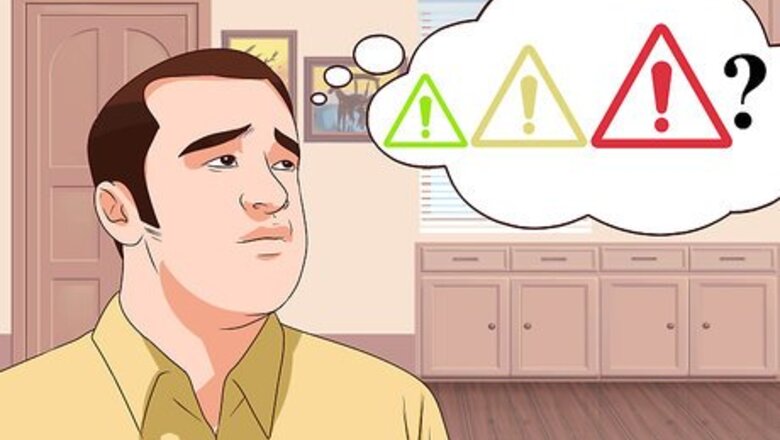
views
Grappling With What You’ve Done

Determine the extent of the damage. It’s important to understand exactly how bad a mistake is before admitting to it. If you underestimate the damage, you run the risk of coming across as incompetent or uncaring. You may need to speak with a neutral third party to accomplish this task. This is particularly true if you’ve hurt somebody, whether physically or emotionally. Talking with a mutual friend or relative may help you determine if the person you hurt is even willing to speak with you at all. If the person you’ve hurt is not willing to speak with you, do not attempt to contact them. If you’ve made a mistake at work, assessing the damage is especially critical. Your boss needs to know that you’re on top of your error. Otherwise, she may not trust you to fix it.

Don’t hide your mistake. The cover-up is often worse than the crime. If you’ve done something bad, admitting it as soon as possible can lessen the damage. This is especially true if you’ve made a serious mistake at work that cost your employer money. If you have bullied someone at school, you need to own up to it. Bullying is much more harmful than you may think. For one thing, bullying victims are far more likely to consider committing suicide than other students. Admitting a mistake may cause other people to be more suspicious of you in the short term. But over the long term, if you establish a reputation as someone who owns up to even the worst errors, other people may trust you more.

Don’t rationalize your bad deed or deeds. Human beings often fall back on rationalizing when they do something bad. Common rationalizations include “oh, it wasn’t so bad” or “it’s OK, everybody does it.” People who abuse their spouse and/or children frequently rationalize their actions. People who suffer from addiction to alcohol or drugs tend to do it as well. Many abusers and addicts are not willing to admit that they are wrong at all. But admitting that you have a problem is the first step towards stopping. There are a variety of different tests available online that you can take to determine if you have a problem with alcohol or other drugs. The key thing to remember is that if your use of alcohol or drugs is causing problems in your life, and you’ve tried to stop but can’t, you may have a problem. Determining if you are an abuser can be a little trickier. But if you often feel resentment towards your partner or children, you may be at risk for abusing them. Other warning signs include high degrees of jealousy, controlling behavior, and quickly resorting to using physical force in an argument.
Admitting What You’ve Done

Plan what you’ll say ahead of time. By planning out your assessment of your mistake, you will seem more competent and prepared. If you’ve done something that you fear will sabotage a friendship or marriage, planning out what you’ll say (and even rehearsing it several times) will show how seriously you’re taking the situation.

Have a solution ready. The other party may not agree with your proposed solution. But if you don’t have something ready to go, you run the risk of looking like you want someone else to fix your mistake. Proposing a solution is a critical part of owning up to an error.

Be forthright. Being as open and honest as possible about your mistake might be the most important thing you can do. By taking full ownership of your error you can show how contrite you are. You can also show how committed you are to fixing the damage that you’ve caused. Beginning with an apology rather than any sort of justification or rationalization can help smooth tensions. For instance, don’t include a statement like “This is partially your fault too.” Simply say “I’m sorry, I know I screwed up and jeopardized our relationship” or “I’m sorry, I know I’ve cost the company money.” Don’t say “I’m sorry if I offended you.” That may come across as halfhearted or insincere. Saying “I’m sorry for what I did” or “I’m sorry for offending you” will demonstrate that you’re well aware of the full impact of your actions.

Stay calm and collected. Getting angry or amped up in any way may lead to increased tensions. And if you’re stressed out, you won’t be able to think clearly. Staying calm will help you maintain control of yourself. Try taking a few deep breaths to help calm yourself down. Breathe in through your nose as you count up to five, and then breathe out through your mouth as you count down from five. You can also try using progressive muscle relaxation before you speak with the person, which is when you tighten and release each of the muscles in your body.

Don’t expect forgiveness. Forgiveness is up to the other person to give. They may not think you deserve it. If that’s the case, be humble. Understand that there may be serious repercussions in store for you even if you’ve come clean about your mistakes. If the person does no forgive you, then try saying something like, “I understand and you have every right to be mad. Again, I am very sorry, and I'd love to make it up to you when and if you're ready.”
Recovering From Your Actions and Fixing It

Give the other person time. Some people can forgive sooner than others. If you’ve done something particularly bad, you may need to give the other person weeks or even months before they’ll be willing to talk to you again. If you’ve made a serious mistake at work, your boss may impose increased scrutiny on you in the future, for instance by subjecting you to a probationary period of time during which another mistake could lead to your dismissal. If the other person doesn't want to see you again, don’t attempt to contact them. This is especially the case if they initiate legal action (like taking out a restraining order) against you. If that happens, read the order carefully and follow its instructions to the letter. Doing otherwise can leave you open to harsh penalties, although these will vary by state. If your mistake costs you your job, don’t dwell on it. Learn from your mistake. Be open about it in the future. Most importantly, do your best to make sure nothing like it ever happens again. Remember that failure can be an excellent teacher. If you never make a mistake, you may never learn much.
Ask what you could do to make up for what you did. If something you admitted to doing has affected your relationship with someone, then you might try asking that person what you could do to help rebuild and repair the trust between you. Or, if what you did has affected your own happiness, then committing to change may be a good option. For example, if you admitted to cheating on your significant other, then asking the person what you can do to regain their trust may help. The person might request more contact with you throughout the day, such as by calling more often to check in. If you want to commit to change for yourself, then consider what changes would help to restore your faith in yourself. You might decide that seeking help for a drinking problem and getting sober would help to restore your faith in yourself.

Seek professional help if necessary. It’s common to feel shame after you’ve done something bad. Don’t let this feeling overwhelm you. If you do, you may be more likely to do something just as bad in the future. Talk to your doctor about finding a therapist or other specialist if you think you require mental health counseling. You can also call a national referral hotline. The National Institute on Abuse and Alcoholism maintains a 24-hour hotline and other resources to help people with addictions start the recovery process. You can also look into support groups in your area. Connecting with other people who can relate to your situation can be a great way to open up to other people and be more honest with yourself.

Prepare for a potentially long process of recovery. Sometimes bad actions are rooted in deep-seated behavior that can take years or even decades to unlearn. Addiction and abusiveness are good examples. Don’t let yourself get discouraged if that’s the case. Dealing with your problem is always better than succumbing to it, even if recovery seems too difficult at the outset.



















Comments
0 comment